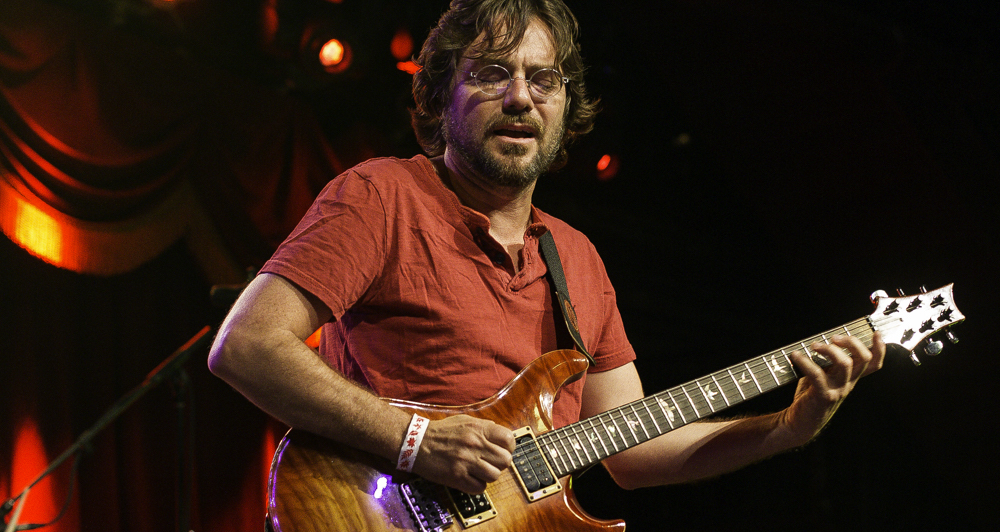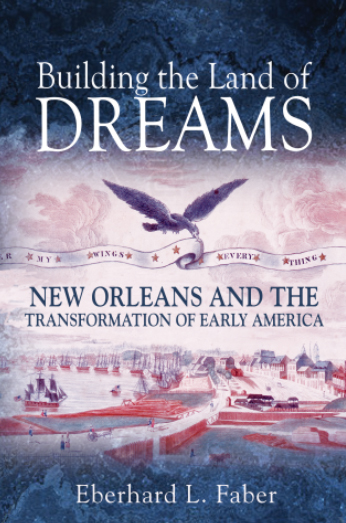50 Years of Jazz Fest: Lo Faber’s ‘Building the Land of Dreams’

photo by Vernon Webb
God Street Wine co-founder Lo Faber, who holds a Ph.D. in history from Princeton, shares his thoughts on the subject of his doctoral dissertation: New Orleans during the late-18th and early-19th century
This article is part of our 50 Years of Jazz Fest celebration and appears in the special Collector’s Edition April/May 2019 issue of Relix. Subscribe here using code NOLA50 and get 20% off.
While Lo Faber may be best known to Relix readers for his role as a founding member of God Street Wine, he occupies an altogether different post within academic circles. In 2012, Faber received his Ph.D. in early-19th century American history from Princeton. His dissertation focused on the development of New Orleans from the 1790s through the 1820s. Faber later adapted this work into a book, published by Princeton University Press, titled Building the Land of Dreams: New Orleans and the Transformation of Early America. His work received the 2015 Kemper and Leila Williams Prize in Louisiana History from the Historic New Orleans Collection and the Louisiana Historical Association.
Faber now serves as a professor of music industry studies at Loyola University New Orleans, while continuing to join God Street Wine onstage and in the studio whenever they reconvene.
What led you, as a grad student, to write about New Orleans?
I was studying early American military history with John Murrin, who is a great retired professor at Princeton, and we were doing an independent study. He suggested I look into the Battle of New Orleans, and I also did a research project for Linda Colley in my British history class about the West Florida Colony that Britain briefly owned in the late-18th century. So I became interested in this region, the Gulf Coast.
Then, when I started thinking about my dissertation, I found this archival collection at Princeton, which had all of the papers of Edward Livingston, who was an attorney. He was mayor of New York City at one point, and then he went bankrupt, and there was a financial scandal and he fled town and went to New Orleans where he became a very influential figure for the next 30 years. He ended up being secretary of state for Andrew Jackson.
I read the whole collection—which would probably be 10,000 pages if you printed it out—and made a database out of all of my notes. That took me about a year to do, and it really made me an expert as to what was going on in New Orleans from about 1800 to 1820. At the same time, I read pretty much every book written about that era, including all the secondary literature and articles. Then, I came down to New Orleans for a year, and I really fell in love with the city on a whole other level.
Did you have any particular associations from God Street Wine’s heyday?
No, not really. We played here a couple of times, but that was just a stop on tour. I do remember I wrote our song “Get on the Train” in the Ramada Inn on the Chef Menteur Highway the afternoon of the show. So I suppose that was my connection to New Orleans.
But, as I said, once I moved down here, I found it interesting, and there’s a lot going on. Still, it’s a relatively small town, and you run into the same people over and over again. Everybody knows each other.
You mentioned the Battle of New Orleans, which was not only one of the rare American victories during the War of 1812, but also notable because it took place after England and the United States had signed a peace treaty to end hostilities.
Yes, and that underscores how New Orleans was remote from the lines of communication. At that time, it was a two-week boat trip up the Mississippi against the current to get there from the Gulf of Mexico. It was a pretty out-of-the-way place, really.
Of course, this sort of thing happened all of the time in wars during the pre-modern era. Battles were fought that maybe shouldn’t have been fought if there had been some sort of central command. But the British were there and they had an army, and Andrew Jackson had his army, so the battle—or a slaughter, really—was had. It was a very one-sided battle. The British just arrogantly assaulted a very fortified position because they had so little respect for Americans at that point. They figured it would be a piece of cake and that didn’t actually happen in this case.
That helped establish Andrew Jackson’s national reputation.
Yes, very much so. The Americans got their ass kicked in the War of 1812. For morale purposes, they made a huge deal of two big victories: one of the naval victories and the Battle of New Orleans. So Andrew Jackson came out looking really good and he eventually became president.
In thinking about New Orleans’ musical heritage, it’s important to understand the city’s early history. Can you walk us through that?
It was founded in 1718 by the French, and the French already had a vast empire in North America but not a lot of people in it. They had all this space in what is now Canada, where they mostly trapped beavers, and the French Empire was based on Indian alliances because they didn’t have a lot of colonists. So they populated New Orleans, initially by sort of rounding up vagrants and prostitutes, and releasing criminals from jail in exchange for going over to populate rural Louisiana. It was a death sentence because there was disease, yellow fever and bad weather. It wasn’t a place you wanted to go live in 1720.
They invested a lot of money in making it work for about 10 years, and they also brought in a lot of Africans. By 1730, the population of the area was about two-thirds African slaves. And then after 1730, the French just gave up on it and let it sort of stagnate. There were no more shiploads of vagrants coming over, no more African slaves. Eventually, in the 1760s when they were in the Seven Years’ War and they were losing, France didn’t want their arch-rival Britain to get a hold of this colony so they gave it to Spain because the king of Spain was the king of France’s cousin. They’re all Catholics and they preferred to keep it like that than to have it go over to the British.

So, in 1763, Louisiana becomes Spanish, but Spain really doesn’t have that much interest in it. They govern it very loosely and they leave the local population in charge of running their own affairs. So starting in the Spanish period, the wealthiest third- and fourth-generation white people in Louisiana had a tremendous amount of power and autonomy to run this society as they saw fit. They had large numbers of slaves, they planted cotton, they were in various trades and they really controlled the course of Louisiana.
Then, in 1800, Napoleon decides that he wants Louisiana back for France. The French have this colony, Saint-Domingue—it’s now known as Haiti—which was the world’s wealthiest sugar colony at that time. They had a slave rebellion in the early-1790s, but Napoleon has a plan to re-enslave the liberated slaves of Saint-Domingue and re-establish the enormous sugar profits for France, while using Louisiana as the breadbasket from which they will feed the colony. So he makes a secret deal with Spain to retrocede Louisiana to France in 1800; although, on the ground, power never changes and the Spanish continue to rule the place. Then Napoleon’s army goes to Saint-Domingue, tries to take over the island with the goal of re-establishing slavery and loses disastrously. So Napoleon gives up on the whole scheme and decides to sell the Louisiana colony to the United States with the Louisiana Purchase in 1803. The Spanish were mightily miffed at that; they never really thought Napoleon’s plan was legit and, therefore, they didn’t think the sale to the United States was legit either, but they didn’t really have the power to oppose it at that point. Their empire was kind of in decline and so The United States takes it over in 1803.
This ushered in a period of an intense economic growth, correct?
Yes, for a couple of decades before the Civil War, New Orleans becomes the third biggest city in North America. It surpasses Boston, and it’s third after New York and Philadelphia. This is due to sugar and cotton profits. All of the cotton that’s grown in the entire cotton boom is shipped to New Orleans. There’s a huge cotton exchange; lots of people get rich until the Civil War puts an end to that.
In the post-war period, there’s really an atmosphere of defeat. Also, while the area thrived during the steamboat era, it wasn’t able to make the transition to the railroad era, due to complacency and lack of capital. So other cities kind of took its place and became much bigger in the late-19th century, such as Atlanta.
What do you think was special about the culture of New Orleans that led to its role as the fount of so much American music?
There was an African-European hybridization going on in New Orleans from very early on that many visitors noticed and remarked on. They had these weekly drum sessions in Congo Square, which is now within Louis Armstrong Park at the back of the French Quarter. And that has to do with the fact that slaves in an urban setting had a lot more freedom and autonomy, and often didn’t even live with their masters. They were just contracted out as hourly labor, and they had these big jam sessions in Congo Square where they played African drums and it was a tourist attraction. People like Benjamin Latrobe came and wrote about it in his travel diary, which was widely read. It created this image of New Orleans as exotic.
The other thing is that there were a lot of free people of color in New Orleans, and they had certain trades that were sort of traditionally reserved for free people of color, and one of those was music teacher. So, a lot of these free people of color were actually music teachers to families, but they studied in Europe and then and brought their skills to New Orleans. That became the germ of a continuing musical culture among the non-white population.
What role did the European cultural legacy play in all of this?
French was the dominant culture. Around that nucleus, you have these orbiting planets of Spanish culture, British, Irish, German—a lot of Germans came over in the early French period, actually. There are some Indians; there are some native New Yorkers like Edward Livingston. And then, also in the 19th century, you have another big influx from France. After Louisiana becomes an American state, there was a lot of immigration from France, which did not happen during the colonial period, and they called these people the foreign French because they’re from France, not Louisiana, and they didn’t mix in with the locals.
Ultimately, the takeaway is that New Orleans was a very cosmopolitan and diverse place—and a place where people were used to encountering people who were different. They were also, presumably, used to hearing a lot of different languages and hearing a lot of different types of performers and singers in the streets. Ultimately, that played a significant role in how New Orleans emerged as a Mecca for music.
This article originally appears in the April/May 2019 issue of Relix. For more features, interviews, album reviews and more, subscribe here.



















